Q: I’m an aspiring author. Can you give me some tips?
A: Read and write as much as you can. It seems deceptively simple, but I think those are the keys. Also, being in a writing class or critique group is helpful. That way you can get feedback and bounce ideas off of people.
One of my favorite authors, Ellen Hopkins, has done a masterful job of answering this question and so many others. Check “For Writers” at www.ellenhopkins.com.
Q: Are you working on a new book?
A: Book #3 is in the early planning stages. All I’ll say about it now, is that I need to go to Thailand to do research!
Q: Where do you get your inspiration?
A: Everywhere. From my life, from my friends’ lives . . . But lately I’ve been into listening to podcasts. I’m addicted to “The Moth” and “This American Life.” “The Moth” is a live taping of people telling true stories--without notes. “This American Life” has all sorts of fiction and nonfiction stories—often with unique twists. A story I heard on “This American Life” actually inspired the idea for my third book.
Q: Why do you write in verse?
A: This is how I’ve always written. When I was younger I was an avid journal writer and my writing never really came out in complete sentences — more like fragments. But as the years have gone by, I’ve learned to play with the format more. Writing in verse gives me the opportunity to lead the reader in a way that’s more aggressive than traditional prose. By changing the line breaks or the way the words are spaced out, I can give a different effect. I can really stress something. Or I can lead a reader to think one thing, and then have it revealed as another when you read the next line. I get to be tricky. (For example, read the excerpt below from You Are Not Here and pay attention to the seventh and eighth lines.)
There are men digging Brian’s grave.
They are digging a hole
in the cool earth,
on a hot day for the boy who has occupied
my thoughts and my heart
for the last three months,
for the boy I lost
my virginity to,
for the boy I think I loved.
Another great thing about writing a novel in verse is how spare I can be. I try to use my words wisely. (BTW, the phrase “use my words wisely” is something I would definitely delete in the editing process. I never want to use phrases that my reader can complete on his/her own. I think it makes the work less unique and the reader less engaged.) And I often try to use as few words as possible. Writing in verse allows me to cut out all the fat and just get to the meat — the emotions — of the story.
Q: Who are some of your favorite poets, contemporary or classic?
A: Erica Jong, Louise Glück, Dorothy Parker, Sylvia Plath, Anne Sexton. And those are just the women…
Q: What are some of your favorite books?
A:
It’s Kind of a Funny Story by Ned Vizzini
Burn Journals by Brent Runyon
Crank by Ellen Hopkins
Stop Pretending: What Happened when My Big Sister Went Crazy by Sonya Sones
The Bell Jar by Sylvia Plat
Water for Elephants by
The Journals of Anais Nin
Fortress of Solitude by Jonathan Lethem
More posts to come soon!
Subscribe to:
Post Comments (Atom)





No comments:
Post a Comment